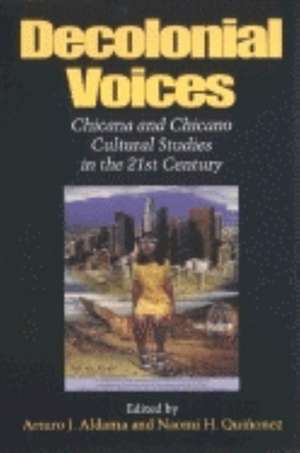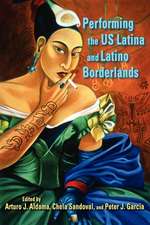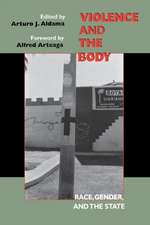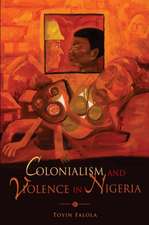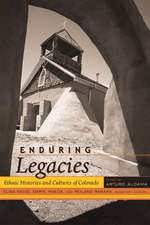Decolonial Voices – Chicana and Chicano Cultural Studies in the 21st Century
Autor Arturo J. Aldama, Naomi Quiñonezen Limba Engleză Paperback – 3 apr 2002
Contributors include Norma Alarcón, Arturo J. Aldama, Frederick Luis Aldama, Cordelia Chávez Candelaria, Alejandra Elenes, Ramón Garcia, María Herrera-Sobek, Patricia Penn Hilden, Gaye T. M Johnson, Alberto Ledesma, Pancho McFarland, Amelia María de la Luz Montes, Laura Elisa Pérez, Naomi Quiñonez, Sarah Ramirez, Rolando J. Romero, Delberto Dario Ruiz, Vicki Ruiz, José David Saldívar, Anna Sandoval, and Jonathan Xavier Inda.
Preț: 209.91 lei
Nou
Puncte Express: 315
Preț estimativ în valută:
40.17€ • 42.05$ • 33.23£
40.17€ • 42.05$ • 33.23£
Carte tipărită la comandă
Livrare economică 05-19 aprilie
Preluare comenzi: 021 569.72.76
Specificații
ISBN-13: 9780253214928
ISBN-10: 0253214920
Pagini: 432
Ilustrații: 22 b&w photos, 1 index
Dimensiuni: 155 x 232 x 25 mm
Greutate: 0.61 kg
Editura: MH – Indiana University Press
ISBN-10: 0253214920
Pagini: 432
Ilustrații: 22 b&w photos, 1 index
Dimensiuni: 155 x 232 x 25 mm
Greutate: 0.61 kg
Editura: MH – Indiana University Press
Cuprins
Contents
Acknowledgments
Foreword by María Herrera-Sobek
Introduction: Peligro! Subversive Subjects: Chicana and Chicano Cultural Studies in the 21st Century." Arturo J. Aldama and Naomi Quiñonez.
PART I: DANGEROUS BODIES
1. Arturo J. Aldama, "Borders, Violence and the Struggles for Chicana/o Subjectivity."
2. Laura Pérez, "Dresses and Body Decoration in Contemporary Chicana Art."
3. Ramón Garcia, "New Iconographies: Film Culture in Chicano Cultural Production."
4. Frederick Luis Aldama, "New Millennia Chicano/a Bodies in Edward J. Olmos' American Me."
5. Jonathan Xavier Inda, "Biopower, Reproduction, and the Migrant Woman's Body."
6. Norma Alarcón, "Anzaldúa's Frontera: Inscribing Gynetics."
PART II: DISMANTLING COLONIAL/ PATRIARCHAL LEGACIES
7. Naomi Quiñonez, "Hijas de La Malinche: Re-Writing Postcolonial Discourse Through the
Literature of First Wave Chicana Writers."
8. Patricia Penn Hilden, "How the Border Lies: Some Historical Reflections."
9. Amelia María de la Luz Montes, "How I am Received": Nationalism, Race and Gender in
Who Would Have Thought It?"
10. Cordelia Candelaria, "Engendering Re/Solutions: The (Feminist) Legacy of Estela Portillo Trambley (1926-1998)."
11. Anna Sandoval, "Unir Los Lazos: Toward a Comparative Study of Chicana and Mexicana
Literature."
12. Sarah Ramirez, "Borders, Feminism and Spirituality: Movements in Chicana Artistic Revisioning."
PART III: MAPPING SPACE AND RECLAIMING PLACE
13. Alejandra Elenes, "Border/Transformative Pedagogies at the End of the Millennium: Chicana/o Cultural Studies and Education."
14. José David Saldívar, "On the Bad Edge of La Frontera."
15. Pancho McFarland, "'Here is Something You Can't Understand': Chicano Rap and the Critique of Globalization."
16. Gaye T. M Johnson, "A Sifting of Centuries: Afro-Chicana/o Interaction and Popular Musical Culture."
17. Alberto Ledesma, "Chicana/o Undocumented Immigrant Narratives as Acts of Political and Intellectual Responsibility."
18. Delberto Dario Ruiz, "Teki Lenguas del Yollotzin (Cut Tongues From the Heart): Colonial Impositions, Hegemonic Borders and Shifting Spaces."
19. Rolando J. Romero. "The Alamo, Slavery and the Politics of Memory."
20. Vicki Ruiz, "Color Coding: Reflections at the Millennium."
Contributors
Index
Acknowledgments
Foreword by María Herrera-Sobek
Introduction: Peligro! Subversive Subjects: Chicana and Chicano Cultural Studies in the 21st Century." Arturo J. Aldama and Naomi Quiñonez.
PART I: DANGEROUS BODIES
1. Arturo J. Aldama, "Borders, Violence and the Struggles for Chicana/o Subjectivity."
2. Laura Pérez, "Dresses and Body Decoration in Contemporary Chicana Art."
3. Ramón Garcia, "New Iconographies: Film Culture in Chicano Cultural Production."
4. Frederick Luis Aldama, "New Millennia Chicano/a Bodies in Edward J. Olmos' American Me."
5. Jonathan Xavier Inda, "Biopower, Reproduction, and the Migrant Woman's Body."
6. Norma Alarcón, "Anzaldúa's Frontera: Inscribing Gynetics."
PART II: DISMANTLING COLONIAL/ PATRIARCHAL LEGACIES
7. Naomi Quiñonez, "Hijas de La Malinche: Re-Writing Postcolonial Discourse Through the
Literature of First Wave Chicana Writers."
8. Patricia Penn Hilden, "How the Border Lies: Some Historical Reflections."
9. Amelia María de la Luz Montes, "How I am Received": Nationalism, Race and Gender in
Who Would Have Thought It?"
10. Cordelia Candelaria, "Engendering Re/Solutions: The (Feminist) Legacy of Estela Portillo Trambley (1926-1998)."
11. Anna Sandoval, "Unir Los Lazos: Toward a Comparative Study of Chicana and Mexicana
Literature."
12. Sarah Ramirez, "Borders, Feminism and Spirituality: Movements in Chicana Artistic Revisioning."
PART III: MAPPING SPACE AND RECLAIMING PLACE
13. Alejandra Elenes, "Border/Transformative Pedagogies at the End of the Millennium: Chicana/o Cultural Studies and Education."
14. José David Saldívar, "On the Bad Edge of La Frontera."
15. Pancho McFarland, "'Here is Something You Can't Understand': Chicano Rap and the Critique of Globalization."
16. Gaye T. M Johnson, "A Sifting of Centuries: Afro-Chicana/o Interaction and Popular Musical Culture."
17. Alberto Ledesma, "Chicana/o Undocumented Immigrant Narratives as Acts of Political and Intellectual Responsibility."
18. Delberto Dario Ruiz, "Teki Lenguas del Yollotzin (Cut Tongues From the Heart): Colonial Impositions, Hegemonic Borders and Shifting Spaces."
19. Rolando J. Romero. "The Alamo, Slavery and the Politics of Memory."
20. Vicki Ruiz, "Color Coding: Reflections at the Millennium."
Contributors
Index
Recenzii
Aldama (Arizona State Univ.) and Quinones (Quinones) (California State Univ., Fullerton) have assembled a remarkable range of essays on topics ranging from dresses and body art, film, popular music (including Chicano rap), and literary works to race, nationalism, and gender. The situation of undocumented workers gets full attention. The collection is especially strong on Chicana issues, redressing the male-centered atmosphere of the early Chicano movement. The level of the writing is high, though a few of the essays are sodden with jargon. The editors provide no overall bibliography, but most of the essays have lengthy bibliographies of their own. The index is unusually detailed, which is very helpful with a wide-ranging collection like this one. The use of illustrations where needed, as in the treatment of film and body art, is a bonus. This essential work cuts across disciplinary boundaries and illuminates many aspects of contemporary Chicana/o life. The work closest to it in spirit is Criticism in the Borderlands, ed. by Hector (Hector) Calderon (Calderon) and Jose (Jose) David Saldivar (Saldivar) (CH, Jun'92), though Decolonial Voices gives more attention to popular culture. All collections.B./P>--B. Almon, University of Alberta"Choice" (01/01/2002)
